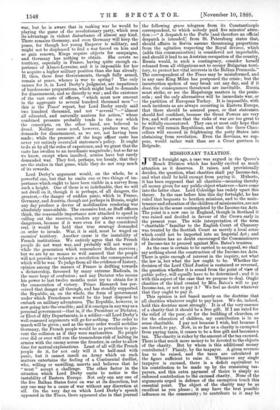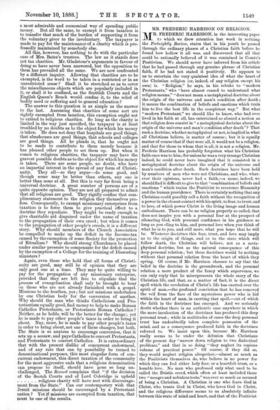MISSIONARY TAXATION.
JUST a fornight ago, a case was argued in the Queen's Bench Division which has hardly excited as much attention as it deserves. It raises, and provisionally decides, the question, what charities shall pay Income-tax, and what shall be held exempt from paying it. Hitherto, it has been supposed that all charities—meaning thereby all money given for any public object whatever—have come into the latter class. Lord Coleridge has rudely upset this theory. In the case before him this day fortnight, he has ruled. that bequests to heathen missions, and to the main- tenance and education of the children of missionaries, are not charities in the sense contemplated by the Income-tax Acts. The point is a new one in England, though in Scotland it was raised and decided in favour of the Crown early in the present year. The wide interpretation of the term " charitable " familiar to the English Court of Chancery was treated by the Scottish Court as merely a local sense which could not be imported into an Imperial Act ; and this decision has no doubt encouraged the Commissioners of Income-tax to proceed against Mrs. Bates's trustees. As the case is certain to be carried to an appeal, we shall say nothing about the construction of the Income-tax Acts.
There is quite enough of interest in the inquiry,, not what the law is, but what the law ought to be. Whether the decision of the Lord Chief Justice is sustained or reversed, the question whether it is sound from the point of viow of public policy, will equally have to be determined ; and it is with this aspect of the case that we propose to deal. Ought charities of the kind created by Mrs. Bates's will to pay Income-tax, or not to pay it ? We feel no doubt whatever that they ought to pay it. This opinion is not based merely on the doctrine that all charities whatever ought to pay taxes. We do, indeed, hold this doctrine most strongly. It is of the very essence of a charity that it should be a free gift. If I am rated for the relief of the poor, or for the building of churches, or for the education of children, my contribution is in no sense charitable. I pay not because I wish, but because I am forced, to pay. Now, in so far as a charity is exempted from paying taxes, it ceases to be a free gift and becomes a tax. The charity is richer by the amount of the tax excused. There is that much more money to be devoted to the objects of the charity. But by whom is this additional money contributed ? Plainly, by the taxpayer. A given revenue has to be raised, and the taxes are calculated at the figure sufficient to raise it. Whenever any single taxpayer is excused, there is a deficit equivalent to his contribution to be made up by the remaining tax- payers, and this extra payment of theirs is simply an enforced contribution to the excused charity. None of the arguments urged in defence of the exemption touch this essential point. The object of the charity may be as excellent as you please ; it may have the best possible influence on the community ; to contribute to it may be a most admirable and economical way of spending public money. But all the same, to exempt it from taxation is to transfer that much of the burden of supporting it from the voluntary giver to the involuntary. The taxpayer is made to pay for the maintenance of a charity which is pro- fessedly maintained by somebody else.
All this, however, has nothing to do with the particular case of Mrs. Bates's trustees. The law as it stands does not tax charities. Mr. Gladstone's arguments in favour of doing so have never been answered, but the opposition to them has prevailed all the same. We are now confronted by a different inquiry. Allowing that charities are to be exempted, is the word to be taken in a restricted or in an unrestricted sense ? Shall it be stretched so as to cover the miscellaneous objects which are popularly included in it, or shall it be confined, as the Scottish Courts and the English Queen's Bench would confine it, to the relief of bodily need or suffering and to general education ?
The answer to this question is as simple as the answer to the last. Assuming that charities of some sort are rightly exempted from taxation, this exemption ought not to extend to religious charities. So long as the charity is limited in the way just specified, the taxpayer is at least troubled by no doubts as to the object for which his money is taken. He does not deny that hospitals are good things, that almshouses are good things, that schools and colleges are good. things. All he pleads is, that he ought not to be made to contribute to them merely because it has pleased other people to set them up. But when it comes to religious charities, the taxpayer may have the gravest possible doubts as to the object for which his money is taken. There are some people, no doubt, who have an impartial interest in the spread of any form of Christi- anity. They all—so they argue—do some good, and though some may be better than others, any one is better than none at all. But this is very far from being a universal doctrine. A great number of persons are of a quite opposite opinion. They are not all prepared to admit that all religions are good. They rigidly confine that com- plimentary statement to the religion they themselves pro- fess. Consequently, to exempt missionary enterprises from taxation is to force them to give practical effect to a doctrine they repudiate. They might be ready enough to give charitable aid disguised under the name of taxation to the propagation of their own creed; but when it comes to the propagation of other people's creeds, it is a different story. Why should members of the Church Association be compelled to make up the deficit in the Income-tax caused by the exemption of some Society for the promotion of Ritualism ? Why should strong Churchmen be placed under similar pressure to compensate for the deficit caused by the exemption of a College for the training of Dissenting ministers ?
Again, even those who hold that all forms of Christi- anity are good, may still be of opinion that they are only good one at a time. They may be quite willing to pay for the propagation of any missionary enterprise, provided that they are left free to stipulate that the process of evangelisation shall only be brought to bear on those who are not already furnished with a gospel. Missions to the heathen, yes ; but not missions undertaken by one Christian body for the conversion of another. Why should the man who thinks Catholicism and Pro- testantism equally good, find money to help to make Roman Catholics Protestants, or Protestants Roman Catholics ?
Neither, as he holds, will be the better for the change ; yet he is made to pay other people's taxes in order to bring it about. Nay, more, he is made to pay other people's taxes in order -to bring about, not one of these changes, but both. The State is so anxious to encourage conversion, that it sets up a seesaw, and pays Catholics to convert Protestants, and Protestants to convert Catholics. It is extraordinary that with the present dislike of concurrent endowMent, and of any rate that can by possibility be turned to denominational purposes, this most singular form of con- current endowment, this direct taxation of the community for the most aggressive ends that a religious denomination can propose to itself, should have gone so long un- challenged, The Record complains that "if the decision of the Scotch Courts and of Lord Coleridge is upheld religious charity will have met with discourage- ment from the State." Can our contemporary wish that Jesuit missions should be encouraged by a Protestant nation ? Yet if missions are exempted from taxation, that must be one of the results.







































 Previous page
Previous page